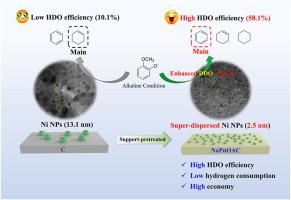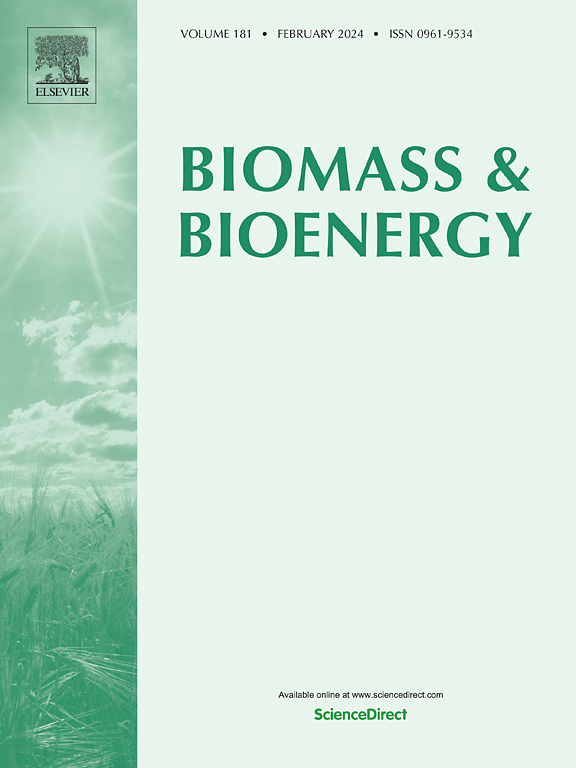Hydrodeoxygenation of guaiacol over modified coconut carbon supported Ni nanoparticles catalysts under alkaline condition
IF 5.8
2区 生物学
Q1 AGRICULTURAL ENGINEERING
引用次数: 0
Abstract
The efficient utilization of lignin from the papermaking black liquor has attracted interest due to its carbon-neutral value and industrial application. This work illustrates a simple support-phosphate-pretreatment strategy to develop superdispersed Ni species in activated carbon (AC) to enhance the hydrodeoxygenation (HDO) reactions of the lignin model compound guaiacol into biohydrocarbons under alkaline conditions. For the first time, sodium polyphosphate was applied as a pretreatment agent for coconut carbon in the synthesis of carbon-supported Ni catalysts. Superdispersed Ni nanoparticles were achieved on Ni/NaPnOAC with a particle size of 2.5 nm, which was much smaller than that on unmodified Ni/C (13.1 nm). The characterization results and reactions revealed that the P−O that formed served as anchoring sites for the Ni species and strengthened the interaction between the Ni species and support (SMSI), which resulted in significantly improved dispersion of the Ni metal sites and, thus, a nearly 6-fold greater yield of hydrocarbons was obtained on Ni/NaPnOAC (58.1 %) than on Ni/C (10.1 %). In addition, compared with Ni2P/NaPnOAC and NiS/NaPnOAC, Ni/NaPnOAC exhibited higher HDO activity, especially higher direct deoxygenation (DDO) activity and higher benzene yield, reducing hydrogen consumption during the HDO reaction.

碱性条件下改性椰子碳支撑镍纳米颗粒催化剂对愈创木酚的加氢脱氧反应
高效利用造纸黑液中的木质素因其碳中和价值和工业应用而备受关注。本研究阐述了一种简单的支持-磷酸盐-预处理策略,在活性炭(AC)中形成超分散的镍物种,以增强木质素模型化合物愈创木酚在碱性条件下的加氢脱氧反应(HDO),将其转化为生物烃。在合成碳支撑镍催化剂的过程中,首次将聚磷酸钠作为椰子碳的预处理剂。在 Ni/NaPnOAC 上实现了超分散镍纳米颗粒,粒径为 2.5 nm,远小于未改性 Ni/C 上的粒径(13.1 nm)。表征结果和反应显示,形成的 P-O 可作为 Ni 物种的锚定位点,并加强了 Ni 物种与支持物(SMSI)之间的相互作用,从而显著改善了 Ni 金属位点的分散性,因此在 Ni/NaPnOAC 上获得的碳氢化合物产率(58.1%)比在 Ni/C 上(10.1%)高出近 6 倍。此外,与 Ni2P/NaPnOAC 和 NiS/NaPnOAC 相比,Ni/NaPnOAC 表现出更高的 HDO 活性,尤其是更高的直接脱氧(DDO)活性和更高的苯产率,从而减少了 HDO 反应过程中的氢消耗。
本文章由计算机程序翻译,如有差异,请以英文原文为准。
求助全文
约1分钟内获得全文
求助全文
来源期刊

Biomass & Bioenergy
工程技术-能源与燃料
CiteScore
11.50
自引率
3.30%
发文量
258
审稿时长
60 days
期刊介绍:
Biomass & Bioenergy is an international journal publishing original research papers and short communications, review articles and case studies on biological resources, chemical and biological processes, and biomass products for new renewable sources of energy and materials.
The scope of the journal extends to the environmental, management and economic aspects of biomass and bioenergy.
Key areas covered by the journal:
• Biomass: sources, energy crop production processes, genetic improvements, composition. Please note that research on these biomass subjects must be linked directly to bioenergy generation.
• Biological Residues: residues/rests from agricultural production, forestry and plantations (palm, sugar etc), processing industries, and municipal sources (MSW). Papers on the use of biomass residues through innovative processes/technological novelty and/or consideration of feedstock/system sustainability (or unsustainability) are welcomed. However waste treatment processes and pollution control or mitigation which are only tangentially related to bioenergy are not in the scope of the journal, as they are more suited to publications in the environmental arena. Papers that describe conventional waste streams (ie well described in existing literature) that do not empirically address ''new'' added value from the process are not suitable for submission to the journal.
• Bioenergy Processes: fermentations, thermochemical conversions, liquid and gaseous fuels, and petrochemical substitutes
• Bioenergy Utilization: direct combustion, gasification, electricity production, chemical processes, and by-product remediation
• Biomass and the Environment: carbon cycle, the net energy efficiency of bioenergy systems, assessment of sustainability, and biodiversity issues.
 求助内容:
求助内容: 应助结果提醒方式:
应助结果提醒方式:


